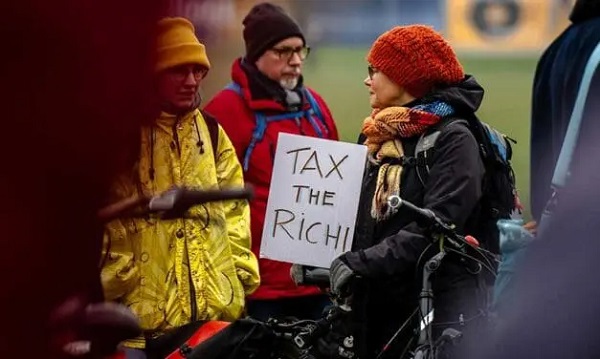Uncategorized
As markets swoon, finance chiefs urge US, China to cool it

NUSA DUA, Indonesia — The heads of the World Bank and IMF appealed Thursday to the U.S. and China to cool their dispute over technology policy and play by world trade rules, as tumbling share prices drove home potential perils from a clash between the world’s two biggest economies.
Global economic growth is slowing but remains strong, Christine Lagarde, managing director of the International Monetary Fund, said on the sidelines of the IMF-World Bank annual meeting, being held this week on the Indonesian island of Bali.
Countries are mostly in a “strong position,” she said, “which is why we believe we are not seeing what is referred to as ‘contagion.'”
But the gyrations that rocked Wall Street the day before and Asia and Europe on Thursday, taking the Shanghai Composite index down 5.2
“It’s the combination of the two that is probably showing some of the tensions that we see in terms of indices, short-term indicators as well as possibly market volatility,” Lagarde said.
The U.S. and Chinese exchanges of penalty tariffs in their dispute isn’t helping, she said.
Her advice was threefold: “De-escalate. Fix the system. Don’t break it.”
She acknowledged that the World Trade Organization, based in Geneva, has made scant headway in recent years toward a global agreement on trade rules that can address issues like complaints over Chinese policies U.S. President Donald Trump says unfairly extract advanced technologies and put foreign companies at a disadvantage in a quest to dominate certain industries.
“Our strong recommendation is to escalate work for a world trade system that is stronger, that is fairer and is fit for the purpose,” she said in opening remarks.
Somewhat obliquely, she said policies aimed toward an excessively “dominant position” were not compatible with free and fair trade.
The IMF has downgraded its forecast for global economic growth to 3.7
World Bank President Jim Yong Kim said the World Bank is working with developing countries to brace for a further deterioration.
“Trade is very critical because that is what has lifted people out of extreme poverty,” Kim said. “I am a globalist. That is my job. That is our only chance of ending extreme poverty. We need more trade not less trade,” he said.
Kim said the World Bank has launched a “human capital index” to help rank countries by the level of their investments in such areas as education and health care.
Policies to build such human capital are among the “smartest investments countries can make,” he said.
He praised host country Indonesia, a democratic, Muslim-majority country of 260 million, for fostering strong growth but noted there was much room for improvement. The country is ranked 87th of 150 countries in the list.
Indonesia has endured a slew of disasters in recent months. Before dawn on Thursday, an earthquake collapsed homes on Indonesia’s Java island, killing at least three people just two weeks after a major quake and tsunami disaster in a central region of the archipelago killed more than 2,000 people and left perhaps thousands more buried deeply in mud.
Thursday’s magnitude 6.0 quake offshore north of Bali shook the area where the IMF-World Bank delegates are meeting, but there were no signs of significant damage.
The annual financial meetings take place at a time of growing concern over trends other than trade, such as moves to raise borrowing costs in the U.S. and some other regions to help cool growth and keep inflation in check. Rising interest rates are drawing investment flows out of emerging markets in Asia and Latin America at a time when growth in their exports is likely to slow.
Argentina and Pakistan, Venezuela and Zimbabwe are among countries grappling with crises. Concerns are growing, also, over slowing growth in China and rising debts among some developing countries resulting from projects associated with Beijing’s “Belt and Road Initiative” to develop ports, roads and other infrastructure.
Lagarde said the IMF will send a team to Pakistan in the coming weeks after a meeting with its finance minister, Asad Umar, in which he requested emergency bailout loans.
The IMF chief did not say how much Umar had requested. Analysts say Pakistan is seeking $8 billion in loans to deal with a balance of payments crisis. Pakistan’s currency plunged by around 7
Asked whether IMF help might amount to a “bailout” for Chinese loans, Lagarde said any such help would have to be completely transparent.
“In whatever work we do we need a complete understanding and complete transparency about the nature of a debt that is bearing on a country,” she said.
The annual summit for global finance brings together central bankers and finance ministers, development experts and civil society groups from across the globe.
Bali has suffered terrorist bombings in the past, and the event was being held amid tight security. A convoy of armed personnel carriers was lined up alongside a beach path and access to the area was tightly controlled.
Still, about a dozen activists concerned with land grabs and other issues sometimes associated with World Bank-sponsored projects staged a brief, peaceful protest over the cancellation by local authorities of a conference they were to hold in the nearby city of Denpasar.
“If they don’t want to ever hear our voices, what kinds of projects are we expecting?” said Joan Salvador, a member of a Philippine women’s group.
Those involved had badges allowing them to enter the tightly guarded venue, and an IMF official said she would convey their concerns “to the highest levels.”
___
Associated Press journalist Hau Dinh contributed to this report.
Elaine Kurtenbach, The Associated Press
Uncategorized
Cost of bureaucracy balloons 80 per cent in 10 years: Public Accounts

The cost of the bureaucracy increased by $6 billion last year, according to newly released numbers in Public Accounts disclosures. The Canadian Taxpayers Federation is calling on Prime Minister Mark Carney to immediately shrink the bureaucracy.
“The Public Accounts show the cost of the federal bureaucracy is out of control,” said Franco Terrazzano, CTF Federal Director. “Tinkering around the edges won’t cut it, Carney needs to take urgent action to shrink the bloated federal bureaucracy.”
The federal bureaucracy cost taxpayers $71.4 billion in 2024-25, according to the Public Accounts. The cost of the federal bureaucracy increased by $6 billion, or more than nine per cent, over the last year.
The federal bureaucracy cost taxpayers $39.6 billion in 2015-16, according to the Public Accounts. That means the cost of the federal bureaucracy increased 80 per cent over the last 10 years. The government added 99,000 extra bureaucrats between 2015-16 and 2024-25.
Half of Canadians say federal services have gotten worse since 2016, despite the massive increase in the federal bureaucracy, according to a Leger poll.
Not only has the size of the bureaucracy increased, the cost of consultants, contractors and outsourcing has increased as well. The government spent $23.1 billion on “professional and special services” last year, according to the Public Accounts. That’s an 11 per cent increase over the previous year. The government’s spending on professional and special services more than doubled since 2015-16.
“Taxpayers should not be paying way more for in-house government bureaucrats and way more for outside help,” Terrazzano said. “Mere promises to find minor savings in the federal bureaucracy won’t fix Canada’s finances.
“Taxpayers need Carney to take urgent action and significantly cut the number of bureaucrats now.”
Table: Cost of bureaucracy and professional and special services, Public Accounts
| Year | Bureaucracy | Professional and special services |
|
$71,369,677,000 |
$23,145,218,000 |
|
|
$65,326,643,000 |
$20,771,477,000 |
|
|
$56,467,851,000 |
$18,591,373,000 |
|
|
$60,676,243,000 |
$17,511,078,000 |
|
|
$52,984,272,000 |
$14,720,455,000 |
|
|
$46,349,166,000 |
$13,334,341,000 |
|
|
$46,131,628,000 |
$12,940,395,000 |
|
|
$45,262,821,000 |
$12,950,619,000 |
|
|
$38,909,594,000 |
$11,910,257,000 |
|
|
$39,616,656,000 |
$11,082,974,000 |
Uncategorized
Trump Admin Establishing Council To Make Buildings Beautiful Again


From the Daily Caller News Foundation
By Jason Hopkins
The Trump administration is creating a first-of-its-kind task force aimed at ushering in a new “Golden Age” of beautiful infrastructure across the U.S.
The Department of Transportation (DOT) will announce the establishment of the Beautifying Transportation Infrastructure Council (BTIC) on Thursday, the Daily Caller News Foundation exclusively learned. The BTIC seeks to advise Transportation Secretary Sean Duffy on design and policy ideas for key infrastructure projects, including highways, bridges and transit hubs.
“What happened to our country’s proud tradition of building great, big, beautiful things?” Duffy said in a statement shared with the DCNF. “It’s time the design for America’s latest infrastructure projects reflects our nation’s strength, pride, and promise.”
“We’re engaging the best and brightest minds in architectural design and engineering to make beautiful structures that move you and bring about a new Golden Age of Transportation,” Duffy continued.
Mini scoop – here is the DOT’s rollout of its Beautifying Transportation Infrastructure Council, which will be tasked with making our buildings beautiful again. pic.twitter.com/
9iV2xSxdJM — Jason Hopkins (@jasonhopkinsdc) October 23, 2025
The DOT is encouraging nominations of the country’s best architects, urban planners, artists and others to serve on the council, according to the department. While ensuring that efficiency and safety remain a top priority, the BTIC will provide guidance on projects that “enhance” public areas and develop aesthetic performance metrics.
The new council aligns with an executive order signed by President Donald Trump in August 2025 regarding infrastructure. The “Making Federal Architecture Beautiful Again” order calls for federal public buildings in the country to “respect regional architectural heritage” and aims to prevent federal construction projects from using modernist and brutalist architecture styles, instead returning to a classical style.
“The Founders, in line with great societies before them, attached great importance to Federal civic architecture,” Trump’s order stated. “They wanted America’s public buildings to inspire the American people and encourage civic virtue.”
“President George Washington and Secretary of State Thomas Jefferson consciously modeled the most important buildings in Washington, D.C., on the classical architecture of ancient Athens and Rome,” the order continued. “Because of their proven ability to meet these requirements, classical and traditional architecture are preferred modes of architectural design.”
The DOT invested millions in major infrastructure projects since Trump’s return to the White House. Duffy announced in August a $43 million transformation initiative of the New York Penn Station in New York City and in September unveiledmajor progress in the rehabilitation and modernization of Washington Union Station in Washington, D.C.
The BTIC will comprise up to 11 members who will serve two-year terms, with the chance to be reappointed, according to the DOT. The task force will meet biannually. The deadline for nominations will end Nov. 21.
-

 Business2 days ago
Business2 days agoCarney’s Toronto cabinet meetings cost $530,000
-

 Bruce Dowbiggin2 days ago
Bruce Dowbiggin2 days agoIntegration Or Indignation: Whose Strategy Worked Best Against Trump?
-

 Artificial Intelligence2 days ago
Artificial Intelligence2 days agoAI is accelerating the porn crisis as kids create, consume explicit deepfake images of classmates
-

 Health2 days ago
Health2 days ago23,000+ Canadians died waiting for health care in one year as Liberals pushed euthanasia
-

 MAiD2 days ago
MAiD2 days ago101-year-old woman chooses assisted suicide — press treats her death as a social good
-

 espionage1 day ago
espionage1 day agoDigital messages reportedly allege Chinese police targeted dissident who died suspiciously near Vancouver
-

 International1 day ago
International1 day agoFBI may have finally nabbed the Jan. 6 pipe bomber
-

 Health2 days ago
Health2 days agoNews RFK Jr.’s vaccine committee to vote on ending Hepatitis B shot recommendation for newborns










